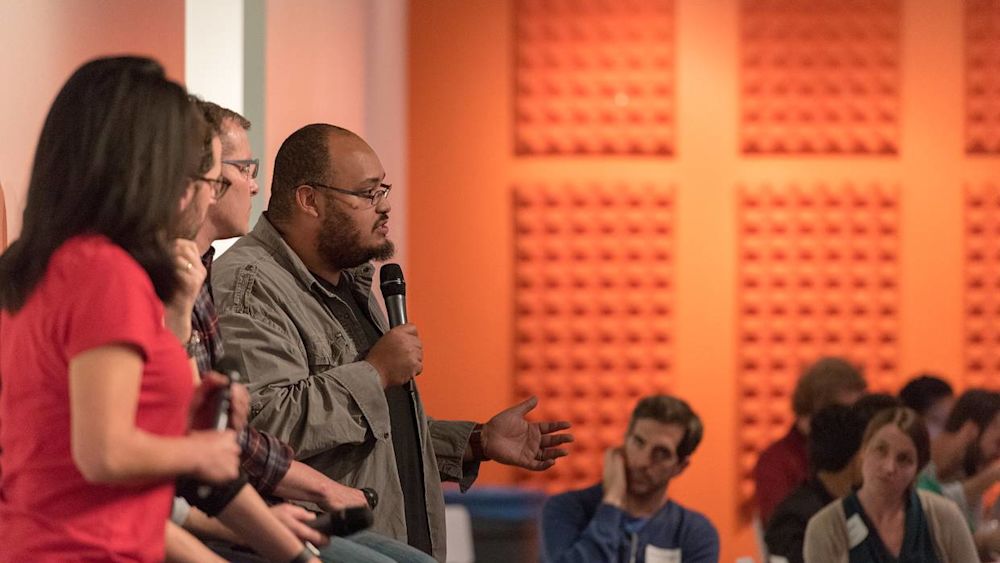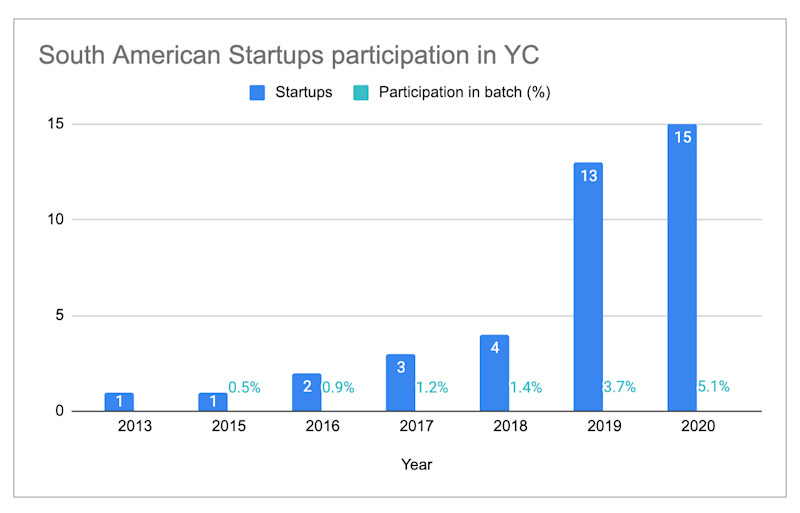- Iterate
- Meet The Team
- Making the Cut: South American Startups Selected by Y Combinator
Making the Cut: South American Startups Selected by Y Combinator
Table of contents
Historically, most of the startups that have gone through YC have been from North America, but this is changing. Participation of South American companies is increasing significantly.

Y Combinator (YC) is the most famous startup accelerator in the world. During its 20 years, YC has contributed to the beginnings of companies such as Dropbox, Airbnb, Rappi, Instacart, Zapier, Twitch, Reddit, and Stripe. Those companies all eventually achieved unicorn valuation, as have many other graduates of the program.
Historically, most of the startups that have gone through YC have been from North America, but this is changing. Participation of South American companies is increasing significantly. To put things into perspective, it’s estimated that 10,000 startups applied for the Winter 2020 batch of YC. Of these, only 115 companies were accepted, and nine (5.1% of the batch) were from South America. Nine seems like a very low number, yet it represents an important increase compared to the single South American startup accepted in 2015 that accounted for 0.5% of that batch.

In total, 39 startups from South America have participated in the YC program. They originate from Argentina (7), Brazil (15), Chile (2), Colombia (13), and Peru (2). In terms of industry, fintech is the most popular sector followed by ecommerce (marketplace), proptech, and edtech. All but one of these startups remain active.
According to Crunchbase, the total funding of all South American YC companies is around $1.5B, with Softbank’s $1B investment in Rappi accounting for the bulk of that funding. These startups have attracted investment from important VC Funds like Sequoia, Monashees, Magma Partners, AltaIr Capital, Global Founders Capital, and others.
From a gender diversity perspective, only six (15.4%) of the South American YC startups have at least one female co-founder. This metric does not stray too far from the research conducted by the Kauffman Fellows Research Center that identified that while only 22% of venture-funded firms had women as part of their leadership teams, startups with at least one female founder raised on average 21% more in venture capital funding than companies with an all-male leadership team.
Startups in South America are increasing substantially as entrepreneurs seek to solve the multiple problems and opportunities faced by the more than 420 million people living in the region. Tackling inequality, financial inclusion, and the on-demand economy could all have big payoffs for those who dare to venture in. Following in the footsteps of giants like Nubank from Brazil, tackling banking, and Rappi in Colombia, serving the on-demand economy, is an aspiration for many.
Check out some of the South American startups that have completed YC and are thriving:
Emi Labs (Argentina)
Emi Labs is automating the hiring process for low-skilled jobs via a conversational Artificial Intelligence platform for HR teams. They leverage AI to decrease hiring cycle times and increase recruiter productivity. Some of their clients include Burger King, Starbucks, 7-Eleven and Danone. They have received over $2M in funding since they were founded in 2017.
Kovi (Brazil)
Kovi rents vehicles to on-demand drivers who work for ride-hailing apps such as Didi and Uber. Owning a car is out of reach for many in Latin America and Kovi is enabling work opportunities by making rental cars available at reasonable fees. The Brazilian company has raised over $40M and has expansion plans to neighboring countries in LatAm.
Quero Bolsa (Brazil)
Quero is an online marketplace that gathers scholarships from more than 6,000 partners to distribute across colleges and schools in Brazil. Students can compare tuition prices, see information about institutions, and apply to scholarships without entering a bureaucratic and inefficient process. Unlike other lending organizations, students don’t have to pay anything back after graduating. To access the scholarships students pay a one time registration fee to Quero that is equivalent to the monthly fee they would pay to the university. More than 700,000 students have enrolled in Quero scholarships.
Fintual (Chile)
Fintual operates as a wealth management platform that allows Latin Americans to invest in fixed income funds and ETF’s. They manage over $150M from 20,000+ customers and have presence in both Chile and Mexico.
Frubana (Colombia)
Frubana is the everything store for restaurants and small retailers in LatAm. They’re on a mission to cut out the intermediary between farmers and restaurant chains, ultimately seeking for businesses to buy goods directly from the field. They are the 3rd most funded LatAm YC startup, having raised $37M.
UBits (Colombia)
Ubits is an e-learning platform that allows for effective re-skilling and upskilling of employees in LatAm. They focus on the employee instead of the teacher to reduce training times, reduce costs, increase coverage, and guarantee the retention of knowledge. They have raised $2.5M, with their most recent investment coming from Stanford’s GSB Impact Fund.
Keynua (Perú)
Keynua is an e-signature platform that uses video-signatures to sign off on specific documents as well as provide the visual identity of the signatory, which is then confirmed using official records and social network profiles. All transactions are then "notarized" on the Blockchain. Keynua received $1.4M in funding in 2019.
The complete list of all the South American startups that have made the cut to participate in YC:
2020
- Oico, Brazil, Consumer
- Henry, Argentina, Edtech
- Hent, Brazil, Proptech
- Plunzo, Argentina, Fintech
- Carupi, Brazil, Consumer
- Alude, Brazil, Proptech
- Apartio, Brazil, Proptech
- Conta Simples, Brazil, Fintech
- ChatPay, Brazil, Consumer
- Todos Comemos, Colombia, Consumer
- Facio, Brazil, Fintech
- Checkars, Argentina, Fintech
- Justo, Chile, Consumer
- Linkana, Brazil, SaaS
- Stark Bank, Brazil, Fintech
2019
- Keynua, Perú, Security
- Kovi, Brazil, Transportation
- Frubana, Colombia, Consumer
- Valiu, Colombia, Fintech
- Mudafy, Argentina, Proptech
- Zippi, Brazil, Fintech
- Truora, Colombia, Security
- Treble.ai, Colombia, Productivity
- Laika, Colombia, Marketplace
- Emi Labs, Argentina, Productivity
- Tranqui, Colombia, Fintech
- Apurata, Perú, Fintech
- Epic Aerospace, Argentina, Space
2015
- Democracy OS, Argentina, Government
2013
- Glio, Brazil, Consumer
--
The Org is a professional community where transparent companies can show off their team to the world. Join your company here to add yourself to the org chart!


The ORG helps
you hire great
candidates
Free to use – try today